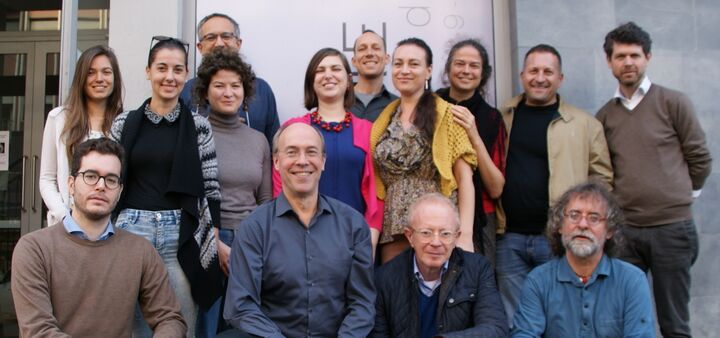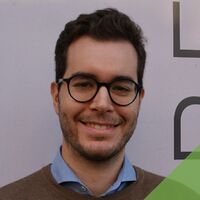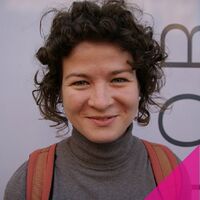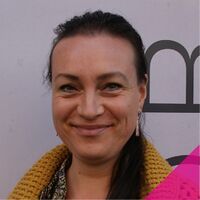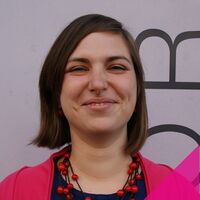Project team LED2LEAD: Difference between revisions
Jump to navigation
Jump to search
No edit summary |
No edit summary |
||
| Line 8: | Line 8: | ||
|- | |- | ||
|[[File:LUIGI.JPG|200px]]||'''Prof. Luigi Bartolomei, Project Coordinator:''' Luigi Bartolomei, Architectural Engineer, obtained his PhD in Design and Architectural Composition at the University of Bologna with a thesis regarding the Phenomenology of Sacred Space. With this body of reserarch he promoted an analysis of archetypal figures in relation to the contemporary landscape and church architecture. He has worked at the School of Engineering and Architecture of the University of Bologna since 2007 among various roles. Luigi Bartolomei began as a tutor in History of Architecture (AA.2007/08 and 08/09) and later as a contract professor teaching Design and Architectural Composition (AA. 2009/10) and Landscape and Infrastructure Design (AA. 2010/11, 2011/12). The later course resulted in superior work between him and his students and was selected among the best projects regarding infrastructures in Italy by UrbanPromo. He is responsible for the Agreement between the Department of Architecture and FTER-Theological Faculty of Emilia-Romagna and subsequent courses that have derived from this collaborative partnership. He is a collaborator of the “The Journal of Architecture” [Il Giornale dell’Architettura] since 2008, where he has found a place for his architectural critic to be fully expressed. More specifically, Bartolomei was the editor of an investigative report regarding the city of Bologna (January 2012), and on the architecture of churches in the 50th anniversary of the Second Vatican Council (December 2012). In 2009 he won, in collaboration with Prof. Giorgio Praderio, a research project PRIN – Research of Relevant National Interest on the preservation and valorization of the landscape in small towns. Bartolomei is also actively involved with the Commission for Sacred Art and Architecture of Bologna Diocese, since 2008. He is currently responsible for the Project of Census of all Catholic Churches in the territory of Bologna’s Archdiocese (which involves more than 690 buildings). Since 2014 he is the director of “IN_BO, Ricerche e progetti per il territorio, la città e l’architettura”, (IN_BO, Researches and projects on territory, towns and architecture), an open-access and peer-reviewed scientific journal of the Department of Architecture at the University of Bologna. | |[[File:LUIGI.JPG|200px]]||'''Prof. Luigi Bartolomei, Project Coordinator:''' Luigi Bartolomei, Architectural Engineer, obtained his PhD in Design and Architectural Composition at the University of Bologna with a thesis regarding the Phenomenology of Sacred Space. With this body of reserarch he promoted an analysis of archetypal figures in relation to the contemporary landscape and church architecture. He has worked at the School of Engineering and Architecture of the University of Bologna since 2007 among various roles. Luigi Bartolomei began as a tutor in History of Architecture (AA.2007/08 and 08/09) and later as a contract professor teaching Design and Architectural Composition (AA. 2009/10) and Landscape and Infrastructure Design (AA. 2010/11, 2011/12). The later course resulted in superior work between him and his students and was selected among the best projects regarding infrastructures in Italy by UrbanPromo. He is responsible for the Agreement between the Department of Architecture and FTER-Theological Faculty of Emilia-Romagna and subsequent courses that have derived from this collaborative partnership. He is a collaborator of the “The Journal of Architecture” [Il Giornale dell’Architettura] since 2008, where he has found a place for his architectural critic to be fully expressed. More specifically, Bartolomei was the editor of an investigative report regarding the city of Bologna (January 2012), and on the architecture of churches in the 50th anniversary of the Second Vatican Council (December 2012). In 2009 he won, in collaboration with Prof. Giorgio Praderio, a research project PRIN – Research of Relevant National Interest on the preservation and valorization of the landscape in small towns. Bartolomei is also actively involved with the Commission for Sacred Art and Architecture of Bologna Diocese, since 2008. He is currently responsible for the Project of Census of all Catholic Churches in the territory of Bologna’s Archdiocese (which involves more than 690 buildings). Since 2014 he is the director of “IN_BO, Ricerche e progetti per il territorio, la città e l’architettura”, (IN_BO, Researches and projects on territory, towns and architecture), an open-access and peer-reviewed scientific journal of the Department of Architecture at the University of Bologna. | ||
'''Project Statement'''. | '''Project Statement''' Text. | ||
|- | |- | ||
|[[File:ANDREA.JPG|200px]]||'''Andrea Conti, Project Coordinator:''' Andrea Conti is a PhD candidate of the department of Urban and Rural Development at the Swedish University of Agricultural Sciences. His research interests draw from the field of design theory, addressing design education and design processes as a way to create knowledge. Andrea studied Engineering of Building and Urban System at the University of Bologna. He received his Master’s Degree after an exchange study program at the University of Oregon, where he studied cycling mobility systems at the department of Landscape Architecture. Since his graduation in 2014, he has collaborated with design studios and municipalities in Italy, working as freelancer in urban mobility design projects. From 2014 to 2016, he collaborated as a tutor in design studio courses at the School of Engineering in Ravenna of the University of Bologna. Since 2018, he is editor of the journal IN_BO – Research and projects on territories, cities and architectures. | |[[File:ANDREA.JPG|200px]]||'''Andrea Conti, Project Coordinator:''' Andrea Conti is a PhD candidate of the department of Urban and Rural Development at the Swedish University of Agricultural Sciences. His research interests draw from the field of design theory, addressing design education and design processes as a way to create knowledge. Andrea studied Engineering of Building and Urban System at the University of Bologna. He received his Master’s Degree after an exchange study program at the University of Oregon, where he studied cycling mobility systems at the department of Landscape Architecture. Since his graduation in 2014, he has collaborated with design studios and municipalities in Italy, working as freelancer in urban mobility design projects. From 2014 to 2016, he collaborated as a tutor in design studio courses at the School of Engineering in Ravenna of the University of Bologna. Since 2018, he is editor of the journal IN_BO – Research and projects on territories, cities and architectures. | ||
| Line 38: | Line 38: | ||
|- | |- | ||
|[[File:DENI.JPG|200px]]||'''Prof. Deni Ruggeri, Project Coordinator:''' Deni Ruggeri is an Associate Professor in the Institute for Landscape Architecture and Spatial Planning at the Norwegian University of Life Sciences (NMBU), Norway. His research focuses on the social dimensions of landscape and urban design, and the promotion and evaluation of bottom-up, participatory co-creation, and redevelopment processes. His work investigates the landscapes' influence on people's place identity and attachment, digital and analog methods, and tools for participatory co-creation, and the design of landscapes that support physical and mental well-being, ecological health, economic viability, identity, delight, and biophilia. He is the author of 25 publications and co-editor of "Defining Landscape Democracy. A Path to Spatial Justice" (Glos, UK: Edward Elgar Publishing, 2019) Deni Ruggeri's education includes a Ph.D. in Landscape Architecture and Environmental Planning from the University of California, Berkeley, and graduate degrees in both Landscape Architecture and City Planning from Cornell University. He has practiced landscape architecture in California and Colorado and has International experience in leading community design and visioning processes and workshops. Before joining NMBU, Deni has taught in the USA at the University of Oregon and Cornell University. Deni Ruggeri has lectured at many institutions around the US, Canada, Europe, and Asia, and is a visiting instructor at UC Davis and the University of California, Berkeley. | |[[File:DENI.JPG|200px]]||'''Prof. Deni Ruggeri, Project Coordinator:''' Deni Ruggeri is an Associate Professor in the Institute for Landscape Architecture and Spatial Planning at the Norwegian University of Life Sciences (NMBU), Norway. His research focuses on the social dimensions of landscape and urban design, and the promotion and evaluation of bottom-up, participatory co-creation, and redevelopment processes. His work investigates the landscapes' influence on people's place identity and attachment, digital and analog methods, and tools for participatory co-creation, and the design of landscapes that support physical and mental well-being, ecological health, economic viability, identity, delight, and biophilia. He is the author of 25 publications and co-editor of "Defining Landscape Democracy. A Path to Spatial Justice" (Glos, UK: Edward Elgar Publishing, 2019) Deni Ruggeri's education includes a Ph.D. in Landscape Architecture and Environmental Planning from the University of California, Berkeley, and graduate degrees in both Landscape Architecture and City Planning from Cornell University. He has practiced landscape architecture in California and Colorado and has International experience in leading community design and visioning processes and workshops. Before joining NMBU, Deni has taught in the USA at the University of Oregon and Cornell University. Deni Ruggeri has lectured at many institutions around the US, Canada, Europe, and Asia, and is a visiting instructor at UC Davis and the University of California, Berkeley. | ||
'''Project Statement'''The challenges our society faces are wicked and defy simplistic problem-solving. Addressing these challenges, from climate change to densification, from public health to sustainable city development cannot be the work of a few experts alone, but result from partnerships between private and public, science and creativity, expert and local knowledge. And, as the European Landscape Convention tells us, the transformations required to address such challenges should be democratic, participatory, equitable, and owned by all residents, native or newcomers, insiders or outsiders. At the foundation of these transformations is the landscape—its natural areas, sacred places, and those abused by urbanization and industrialization. Re-interpreted as a shared resource for future resilience, this landscape needs to be re-discovered, re-generated, and integrated into the fabric of our communities, so it may bring livability, health and delight to those residents that need it the most—the marginalized, the unheard, the outcast, the queer. The LED2LEAP foregrounds this commitment to partnerships in co-creation, by linking community organizations to the creativity of budding design and planning professionals. It does so through an educational program educating them about the theory, methods, and practices of landscape democracy in the context of a pedagogy that frees communities and students from pre-existing pre-conceptions and limitations to unleash creative partnerships of mutual learning and cross-contamination. The ultimate goal is to envision new futures for the landscape, the communities, and those who call these landscapes home. The LED2LEAP project aims to plant to seed for meaningful transformations in its partner communities, the campuses of our educational partners, and the minds and hearts of the students, volunteers, tutors, community partners, and instructors it will bring together. | '''Project Statement''' The challenges our society faces are wicked and defy simplistic problem-solving. Addressing these challenges, from climate change to densification, from public health to sustainable city development cannot be the work of a few experts alone, but result from partnerships between private and public, science and creativity, expert and local knowledge. And, as the European Landscape Convention tells us, the transformations required to address such challenges should be democratic, participatory, equitable, and owned by all residents, native or newcomers, insiders or outsiders. At the foundation of these transformations is the landscape—its natural areas, sacred places, and those abused by urbanization and industrialization. Re-interpreted as a shared resource for future resilience, this landscape needs to be re-discovered, re-generated, and integrated into the fabric of our communities, so it may bring livability, health and delight to those residents that need it the most—the marginalized, the unheard, the outcast, the queer. The LED2LEAP foregrounds this commitment to partnerships in co-creation, by linking community organizations to the creativity of budding design and planning professionals. It does so through an educational program educating them about the theory, methods, and practices of landscape democracy in the context of a pedagogy that frees communities and students from pre-existing pre-conceptions and limitations to unleash creative partnerships of mutual learning and cross-contamination. The ultimate goal is to envision new futures for the landscape, the communities, and those who call these landscapes home. The LED2LEAP project aims to plant to seed for meaningful transformations in its partner communities, the campuses of our educational partners, and the minds and hearts of the students, volunteers, tutors, community partners, and instructors it will bring together. | ||
|- | |- | ||
|[[File:IVETT.JPG|200px]]||'''Ivett Szabo-Szeles, Project Coordinator:''' Text. | |[[File:IVETT.JPG|200px]]||'''Ivett Szabo-Szeles, Project Coordinator:''' Text. | ||
